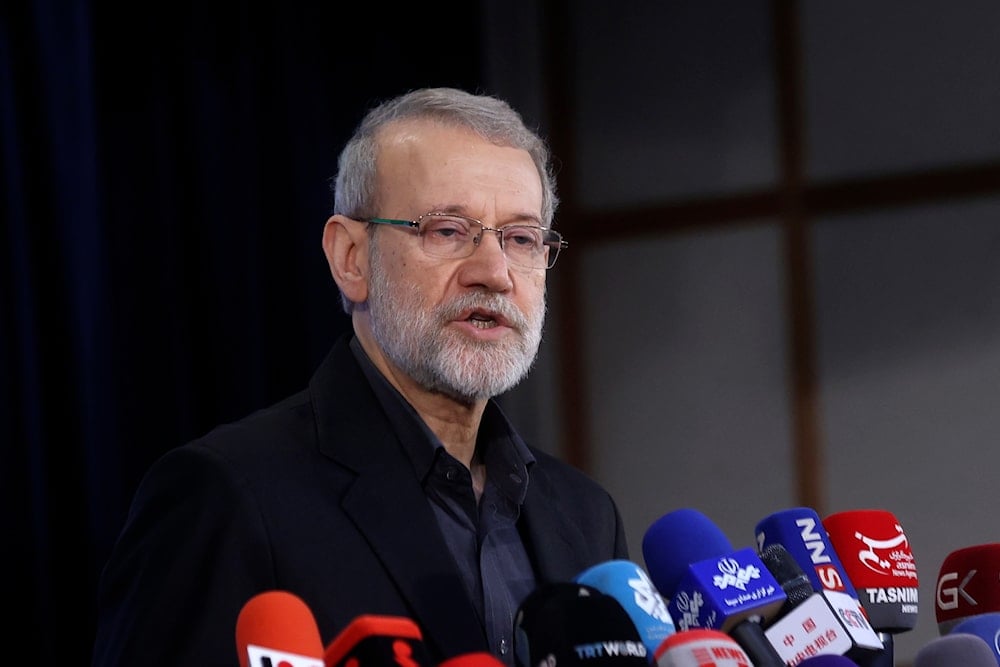Iran remains open to genuine talks, no predetermined results: Larijani
The secretary of the SNSC says Iran’s nuclear programme is peaceful and rejects US-led dismantling demands, affirming Tehran’s openness to real negotiations.
-

Secretary of Iran's Supreme National Security Council Ali Larijani speaks with the media after registering his name as a candidate for the June 28 presidential elections at the Interior Ministry in Tehran, Iran, May 31, 2024 (AP)
Secretary of Iran's Supreme National Security Council Ali Larijani rejected calls to dismantle the country’s nuclear programme, insisting that it remains peaceful, while stressing that Tehran remains open to real negotiations.
In an interview for Pakistani Hum News, Larijani emphasized that discussions about dismantling Iran’s nuclear programme are “immature”, adding that “we have thousands of nuclear experts. Iran has already passed that stage, but we are not building nuclear weapons."
"Our path is peaceful,” he stressed, asserting the country’s continued commitment to a non-military nuclear trajectory.
Furthermore, he told Hum News that while Iran is willing to negotiate, it refuses negotiations in which outcomes are pre-decided, referring to the United States' demands for Iran, emphasizing that Tehran did not and will not abandon what he termed "real negotiations".
This comes as the West continues to pursue a strategy of pressure against Iran for its nuclear program, most recently approving an IAEA resolution against Tehran.
US lacks genuine willingness to negotiate: Araghchi
On his part, Iranian Foreign Minister Abbas Araghchi says Iran has always been ready to negotiate over its nuclear program, stressing that the problem lies in the American side’s lack of a “genuine willingness to negotiate.”
In an exclusive interview for France 24 on Wednesday during his visit to Paris, where he also held talks with his French counterpart, Jean-Noël Barrot, Araghchi asserted, “We are ready to negotiate. We have always been ready. In 2015, we negotiated and reached the nuclear agreement. In 2025, we were also in the middle of negotiations when the United States and Israel attacked us. We have always been ready to negotiate, but for genuine, serious negotiations. Negotiation means dialogue, not dictation."
Genuine, serious intent won't be met with a 'no'
He added that whenever the US government announces its willingness to set aside its imposed demands and engage in a genuine, serious dialogue aimed at achieving mutual interests and a win–win outcome, Iran will never say "no".
“But at the moment, we do not see such readiness from the United States,” Araghchi noted.
He also said that there has been no recent contact or exchange of messages between Tehran and Washington, adding that Iran is in no hurry to resume negotiations.
On the role of Saudi Arabia as a mediator between Washington and Tehran, Araghchi said there is trust between Iran and Saudi Arabia and that the two sides have been improving and expanding their relations in recent years.
“Cooperation among regional countries, especially Iran and Saudi Arabia as two major powers, plays a key role in regional stability. But regarding the nuclear issue, our problem is not the absence of a mediator; the problem is the US approach and behavior itself,” he said.
IAEA adopts anti-Iran resolution
On November 20, the IAEA's Board of Governors adopted the European-proposed resolution on the Iranian nuclear file, securing 19 votes in favor, three against, and 12 abstentions, reflecting divisions within the international community over how to address Iran’s nuclear file in the aftermath of the June war.
The recent resolution passed by the IAEA Board of Governors demands that Iran provide immediate and comprehensive clarification regarding its enriched uranium stockpile and grant full access to nuclear sites impacted during the June attacks.
The resolution, drafted by the United States alongside the E3 (Germany, France, and the United Kingdom), claims that Iran has not sufficiently addressed concerns related to undeclared nuclear activities, particularly at locations damaged by foreign strikes.
It also calls on Iran to resume full cooperation under its safeguards agreement, urging Tehran to allow inspectors broader access to facilities and documentation. However, the resolution avoids any mention of the military assaults carried out against Iran’s peaceful nuclear infrastructure, raising objections over its one-sided nature.
In response, Iran formally cancelled the Cairo agreement with the IAEA, informing the IAEA Director General Rafael Grossi that the arrangement is no longer valid and is considered officially ended, according to Iranian Foreign Minister Abbas Araghchi.

 4 Min Read
4 Min Read








